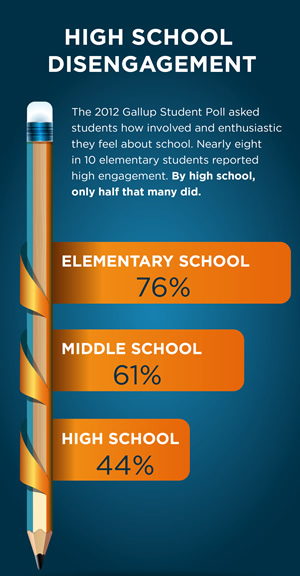There was a time when simply graduating high school with the basic curriculum understanding was enough to put you on a good course towards solid college and career opportunities. But times have changed.
With millions more young people graduating from high school than ever before and a competitive global marketplace that demands highly technical and academic skills, basic curriculum knowledge is no longer sufficient.
A 2008 report on college and career readiness from ACT, the nonprofit education and workforce development organization best known for administering the ACT® college readiness assessment test, underscores the importance of preparing students with skills that can allow them to adapt to an ever-changing landscape of college and workforce demands:
“Improving the college and career readiness of all our students will provide a better foundation of knowledge and skills to allow future workers to adapt to the changing requirements of a more technologically sophisticated and internationally competitive working world.”
It’s no surprise then that the current administration would stress the need to “redesign America’s high schools so they better equip graduates for the demands of a high-tech economy” with an emphasis on developing “new partnerships with colleges and employers, and create classes that focus on science, technology, engineering and math.” Such STEM curriculum has long been seen as a weak link in the American educational system with comparatively American students choosing these fields of expertise and even fewer teachers available to teach those subjects. A greater focus on STEM learning has been seen as a key component of college and career readiness investements.
Kaiser Permanente & Denver Public Schools taking STEM seriously
 Last week, Kaiser Permanente Colorado announced its intent to put greater emphasis on STEM learning and college and career readiness through a $650,000 grant to Denver Public Schools.
Last week, Kaiser Permanente Colorado announced its intent to put greater emphasis on STEM learning and college and career readiness through a $650,000 grant to Denver Public Schools.
The grant, administered through the Denver Public Schools Foundation, will help Denver Public Schools build a clearly-defined college and career-readiness pipeline in the biomedical field at four DPS high schools. The initial goal is to reach more than 2,000 students throughout the course of the three-year grant.
“This program will provide students from underserved communities in Denver with an opportunity to prepare for a career in health — one of the fastest growing industries in our state. Colorado needs a well-educated and well-trained workforce of the future, and we’re thrilled to help make this program possible for Denver youth,” said Donna Lynne, DrPH, president of Kaiser Permanente Colorado.
Starting before high school is key
 In the 2008 ACT report, a key finding emphasized the importance of supporting college and career readiness throughout a student’s K-12 educational experience.
In the 2008 ACT report, a key finding emphasized the importance of supporting college and career readiness throughout a student’s K-12 educational experience.
“Less attention, it seems, has been paid to the importance of the upper elementary grades and middle school and the role they must play in the preparation of students for life after high school. The results of our research show that the amount of progress toward college and career readiness that students have made by eighth grade is crucial to their future success.”
A 2012 Gallup Student Poll showing trends in high school disengagement underscores this argument. When asked how engaged students feel in school, 76% of students at the elementary school level felt involved and enthusiastic, whereas by high school, that number had dropped to 44%.
In his blog post on the HotChalk education network, Dr. Jason Perez, an elementary school principal in Oklahoma and education professor, reminds readers that college and career readiness requires efforts from all sides.
“Emphasizing college and career readiness must begin at an early age. Not only must teachers help prepare students for the future, but administrators, including principals, superintendents and school boards, also must be supportive through policy implementation and community partnerships.”
The link between education and a lifetime of health
College and career readiness isn’t just good for the economy, it’s critical to supporting a lifetime of health. As reported in a previous Thriving Schools blog post on “Why Education Matters to Health,” recent research out of Virginia Commonwealth University’s Center on Society and Health shows how a strong education – one that sets young people up for college and career success – can lead to better jobs, higher earnings, reduced stress and many other benefits that support good health.
Clearly, thoughtful investment in college and career readiness efforts go a long way in building the skills of students and setting them up for a lifetime of success. How we make those investments and design school learning curriculums now might ultimately decide the fate of our nation’s neighborhoods and communities and the extent to which they prosper.




